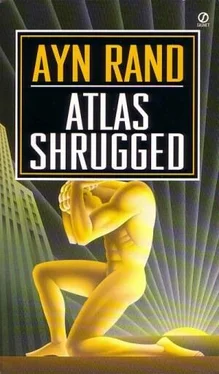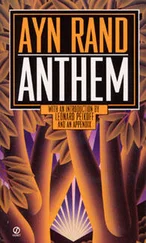He stepped to the front of the engine and looked up at the letters TT. Then he collapsed across the rail and lay sobbing at the foot of the engine, with the beam of a motionless headlight above him going off into a limitless night.
The music of Richard Halley's Fifth Concerto streamed from his keyboard, past the glass of the window, and spread through the air, over the lights of the valley. It was a symphony of triumph. The notes flowed up, they spoke of rising and they were the rising itself, they were the essence and the form of upward motion, they seemed to embody every human act and thought that had ascent as its motive. It was a sunburst of sound, breaking out of hiding and spreading open. It had the freedom of release and the tension of purpose. It swept space clean and left nothing but the joy of an unobstructed effort. Only a faint echo within the sounds spoke of that from which the music had escaped, but spoke in laughing astonishment at the discovery that there was no ugliness or pain, and there never had had to be. It was the song of an immense deliverance.
The lights of the valley fell in glowing patches on the snow still covering the ground. There were shelves of snow on the granite ledges and on the heavy limbs of the pines. But the naked branches of the birch trees had a faintly upward thrust, as if in confident promise of the coming leaves of spring.
The rectangle of light on the side of a mountain was the window of Mulligan's study. Midas Mulligan sat at his desk, with a map and a column of figures before him. He was listing the assets of his bank and working on a plan of projected investments. He was noting down the locations he was choosing: "New York—Cleveland—Chicago . . . New York—Philadelphia . . . New York . . . New York . . . New York . . ."
The rectangle of light at the bottom of the valley was the window of Danneskjold's home. Kay Ludlow sat before a mirror, thoughtfully studying the shades of film make-up, spread open in a battered case.
Ragnar Danneskjold lay stretched on a couch, reading a volume of the works of Aristotle: ". . . for these truths hold good for everything that is, and not for some special genus apart from others. And all men use them, because they are true of being qua being. . . . For a principle which every one must have who understands anything that is, is not a hypothesis. . . . Evidently then such a principle is the most certain of all; which principle this is, let us proceed to say. It is, that the same attribute cannot at the same time belong and not belong to the same subject in the same respect. . ."
The rectangle of light in the acres of a farm was the window of the library of Judge Narragansett. He sat at a table, and the light of his lamp fell on the copy of an ancient document. He had marked and crossed out the contradictions in its statements that had once been the cause of its destruction. He was now adding a new clause to its pages: "Congress shall make no law abridging the freedom of production and trade . . ."
The rectangle of light in the midst of a forest was the window of the cabin of Francisco d'Anconia. Francisco lay stretched on the floor, by the dancing tongues of a fire, bent over sheets of paper, completing the drawing of his smelter. Hank Rearden and Ellis Wyatt sat by the fireplace. "John will design the new locomotives," Rearden was saying, "and Dagny will run the first railroad between New York and Philadelphia. She—" And, suddenly, on hearing the next sentence, Francisco threw his head up and burst out laughing, a laughter of greeting, triumph and release. They could not hear the music of Halley's Fifth Concerto now flowing somewhere high above the roof, but Francisco's laughter matched its sounds. Contained in the sentence he had heard, Francisco was seeing the sunlight of spring on the open lawns of homes across the country, he was seeing the sparkle of motors, he was seeing the glow of the steel in the rising frames of new skyscrapers, he was seeing the eyes of youth looking at the future with no uncertainty or fear.
The sentence Rearden had uttered was: "She will probably try to take the shirt off my back with the freight rates she's going to charge, but— I’ll be able to meet them."
The faint glitter of light weaving slowly through space, on the highest accessible ledge of a mountain, was the starlight on the strands of Galt's hair. He stood looking, not at the valley below, but at the darkness of the world beyond its walls. Dagny's hand rested on his shoulder, and the wind blew her hair to blend with his. She knew why he had wanted to walk through the mountains tonight and what he had stopped to consider. She knew what words were his to speak and that she would be first to hear them.
They could not see the world beyond the mountains, there was only a void of darkness and rock, but the darkness was hiding the ruins of a continent: the roofless homes, the rusting tractors, the lightless streets, the abandoned rail. But far in the distance, on the edge of the earth, a small flame was waving in the wind, the defiantly stubborn flame of Wyatt's Torch, twisting, being torn and regaining its hold, not to be uprooted or extinguished. It seemed to be calling and waiting for the words John Galt was now to pronounce.
"The road is cleared," said Galt. "We are going back to the world."
He raised his hand and over the desolate earth he traced in space the sign of the dollar.
THE END
"My personal life," says Ayn Rand, "is a postscript to my novels; it consists of the sentence: 'And I mean it.' I have always lived by the philosophy I present in my books— and it has worked for me, as it works for my characters. The concretes differ, the abstractions are the same.
"I decided to be a writer at the age of nine, and everything I have done was integrated to that purpose. I am an American by choice and conviction. I was born in Europe, but I came to America because this was the country based on my moral premises and the only country where one could be fully free to write. I came here alone, after graduating from a European college. I had a difficult struggle, earning my living at odd jobs, until I could make a financial success of my writing. No one helped me, nor did I think at any time that it was anyone's duty to help me.
"In college, I had taken history as my major subject, and philosophy as my special interest; the first—in order to have a factual knowledge of men's past, for my future writing; the second—in order to achieve an objective definition of my values. I found that the first could be learned, but the second had to be done by me.
"I have held the same philosophy I now hold, for as far back as I can remember. I have learned a great deal through the years and expanded my knowledge of details, of specific issues, of definitions, of applications—and I intend to continue expanding it—but I have never had to change any of my fundamentals. My philosophy, in essence, is the concept of man as a heroic being, with his own happiness as the moral purpose of his life, with productive achievement as his noblest activity, and reason as his only absolute.
"The only philosophical debt I can acknowledge is to Aristotle. I most emphatically disagree with a great many parts of his philosophy—but his definition of the laws of logic and of the means of human knowledge is so great an achievement that his errors are irrelevant by comparison. You will find my tribute to him in the titles of the three parts of ATLAS SHRUGGED.
"My other acknowledgment is on the dedication page of this novel. I knew what values of character I wanted to find in a man. I met such a man—and we have been married for twenty-eight years. His name is Frank O'Connor.
"To all the readers who discovered The Fountainhead and asked me many questions about the wider application of its ideas, I want to say that I am answering these questions in the present novel and that The Fountainhead was only an overture to ATLAS SHRUGGED.
Читать дальше










